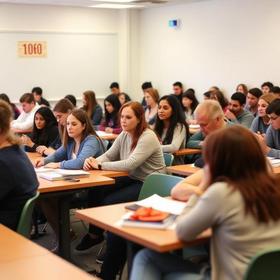- Clark College is a community college providing two-year transfer degree studies; bachelor's associate's degrees and certificate technical training, and basic skills classes each quarter.
School Highlights
Clark College serves 9,068 students (46% of students are full-time).
The college's student-teacher ratio of 11:1 is lower than the state community college average of 15:1.
Minority enrollment is 39% of the student body (majority Hispanic), which is less than the state average of 56%.
Quick Facts (2026)
- Enrollment: 9,068 students
- In-state tuition: $3,653
- Out-state tuition: $8,843
- Student-teacher ratio: 11:1
- Minority enrollment: 39%
- Source: Verified school update
Top Rankings
Clark College ranks among the top 20% of public schools in Washington for:
Category
Attribute
Community Size
School Overview
The teacher population of 799 teachers has stayed relatively flat over five years.
Clark College
(WA) Community College Avg.
Carnegie Classification
Baccalaureate/Associate's Colleges: Associate's Dominant
Baccalaureate/Associate's Colleges: Associate's Dominant
Institution Level
Four or more years
Four or more years
Institution Control
Public
Public
Total Faculty
799 staff
353 staff
School Calendar
Student Body
The student population of Clark College has stayed relatively flat over five years.
The student-teacher ratio of 11:1 has decreased from 33:1 over five years.
The Clark College diversity score of 0.58 is less than the state average of 0.75. The school's diversity has stayed relatively flat over five years.
Total Enrollment
9,068 students
5,207 students
Student-Teacher Ratio
11:1
15:1
# Full-Time Students
4,206 students
2,028 students
# Part-Time Students
4,862 students
3,179 students
# Enrollment Undergraduate
906 students
494 students
# Full-Time Undergraduate Students
4,206 students
2,028 students
# Part-Time Undergraduate Students
4,862 students
3,179 students
Total Dormitory Capacity
n/a
140 students
% American Indian/Alaskan
1%
1%
% Asian
6%
10%
% Hispanic
15%
17%
% Black
3%
7%
% White
61%
44%
% Hawaiian
1%
1%
% Two or more races
7%
8%
% Non Resident races
1%
3%
% Unknown races
5%
9%
Diversity Score
0.58
0.75
College Completion Rate (Students who graduate in less than 4 years)
25%
30%
College Completion Rate (Students who graduate in 4 years or more than 4 years)
39%
36%
Average Graduate Earnings (10 Years)
$38,300
$36,400
Tuition and Acceptance Rate
The public in-state tuition of $3,653 is less than the state average of $4,105. The in-state tuition has declined by 7% over four years.
The public out-state tuition of $8,843 is more than the state average of $7,359. The out-state tuition has declined by 9% over four years.
In-State Tuition Fees
$3,653
$4,105
Out-State Tuition Fees
$8,843
$7,359
% Students Receiving Some Financial Aid
44%
58%
Median Debt for Graduates
$11,206
$11,794
Median Debt for Dropouts
$5,400
$6,192
Acceptance Rate
n/a
99%
Sports
Total Sports Offered
7 sports
Sports
BaseballBasketball
Cross CountrySoccer
SoftballTrack and Field
Volleyball
Source: 2024 (or latest year available) Integrated Postsecondary Education Data System (IPEDS) , School Administrators
School Notes
- School Mascot: Penguins
- Clark College was founded as a private, two-year junior college in 1933 and was granted initial accreditation in 1936-37 based upon a visit by a committee of five professors from the University of Washington. The college received accreditation from the Northwest Association of Schools and Colleges in 1948 and has maintained that standing through periodic reviews to the present. In 1951, an evening program began and the Applied Arts Center became the first building on the current 80-acre campus in Vancouver's Central Park. Student enrollment settled at around 4,800 through the late 1950s and early 1960s; then grew again to the 8,000 mark by the end of the 1970s reflecting a population surge in Clark County. A reduction in funding and a State-mandated lid kept enrollments level during the mid-1980s. The location of several major electronics firms and related-service industries in Clark County spurred strong economic growth, multiple employment opportunities for Clark's associate in applied science degree graduates, and boosted enrollments to nearly 11,000 students per quarter during the past 10 years. The main campus is located on an 90-acre arboretum in Vancouver's historic Central Park just east of the Interstate 5 freeway and north of the Columbia River and Fort Vancouver Historic Reserve. Classes are also offered at the Washington State University Vancouver branch campus in Salmon Creek and the Columbia Tech Center satellite nine miles east of the main campus. The establishment of a Washington State University branch campus in Vancouver in 1989 and creation of the Cooperative Agreement for Transfer (CAT) between Clark College and WSU Vancouver..
Frequently Asked Questions
How much does Clark College cost?
Clark College's tuition is approximately $3,653 for In-State students and $8,843 for Out-State students.
What sports does Clark College offer?
Clark College offers 7 interscholastic sports: Baseball, Basketball, Cross Country, Soccer, Softball, Track and Field and Volleyball.
What is Clark College's ranking?
Clark College ranks among the top 20% of community college in Washington for: Largest student body.
In what neighborhood is Clark College located?
Clark College is located in the Central Park neighborhood of Vancouver, WA.
Recent Articles

Part-Time vs. Full-Time Enrollment in 2025: Which Is Better?
Explore part-time vs. full-time enrollment in 2025, comparing costs, flexibility, outcomes, and goals to help students choose the right path.

How Community Colleges Use AI Tools to Support Student Success
Explore how community colleges are using AI tools in 2025 to improve advising, learning, retention, and student success.

Nontraditional Student’s Guide to Community College 2025
Comprehensive guide for nontraditional students at community college with updated tuition, support, careers, and success strategies for 2025.









